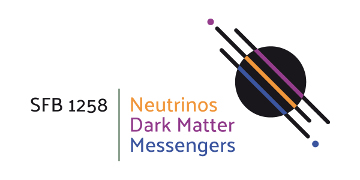This selection underscores the scientific excellence and strategic relevance of both major projects and marks a decisive milestone for their future implementation. Inclusion on the shortlist is also a significant achievement for the ORIGINS Cluster of Excellence and the Collaborative Research Center 1258 (SFB1258) at TUM, both of which have played a key role in the conceptual and scientific development of LEGEND-1000 and IceCube-Gen2.
Major Milestone for the ORIGINS Cluster of Excellence and SFB1258
Prof. Stefan Schönert remarked, “LEGEND-1000 will be the most sensitive experiment for the search for neutrinoless double beta decay – one of the key processes in exploring the nature of neutrinos and the origin of matter in the universe. Being shortlisted confirms the international significance of our project and brings us a major step closer to realizing this unique research infrastructure.”
Prof. Elisa Resconi points to the ways the current IceCube Neutrino Observatory will be enhanced: “IceCube-Gen2 will make it possible to detect high-energy neutrinos from space with unprecedented sensitivity and will open new frontiers in astroparticle physics. The BMFTR’s decision is a strong signal to the entire scientific community.”
Nine projects were shortlisted for scientific excellence
Out of more than 60 initial submissions, 32 proposals advanced to the evaluation phase, from which nine projects were ultimately selected for the shortlist. According to the BMFTR and the German Science and Humanities Council, these projects meet the highest standards in scientific excellence, planning maturity, innovation potential, and international visibility.
The further development of the selected projects will now proceed in close coordination with the German Science and Humanities Council as well as the participating research institutions and federal states. In parallel, the BMFTR is planning to institutionalize the procedure and conduct a new round in 2028.
Further information
LEGEND-1000 (Large Enriched Germanium Experiment for Neutrinoless Double Beta Decay) is a planned international large-scale experiment aimed at investigating the rare physical process of neutrinoless double beta decay. The goal of the experiment is to determine whether the neutrino is its own antiparticle (a Majorana particle) – an assumption with far-reaching consequences for our understanding of the matter–antimatter asymmetry in the universe. The LEGEND-1000 FIS proposal was submitted by the Max Planck Institute for Nuclear Physics and the Technical University of Munich.
IceCube-Gen2 is the planned extension of the existing IceCube neutrino observatory, located more than two kilometers deep in Antarctic ice at the geographic South Pole. The project aims to significantly enhance the detection and study of high-energy cosmic neutrinos, with greatly improved sensitivity and resolution. IceCube-Gen2 is expected to provide new insights into the origins and mechanisms of the most energetic processes in the universe. The IceCube-Gen2 FIS proposal is led by DESY and the Karlsruhe Institute of Technology (KIT), with the Technical University of Munich (TUM) as a partner institution.
Links
- German Federal Ministry of Research, Technology and Space https://www.bmbf.de/EN/Home/home_node.html
- ORIGINS Cluster of Excellence https://www.origins-cluster.de/en/
- Collaborative Research Center “Neutrinos and Dark Matter in Astro- and Particle Physics” https://www.sfb1258.de/



